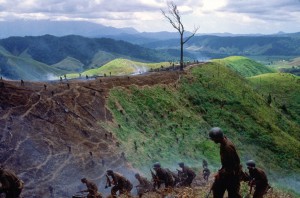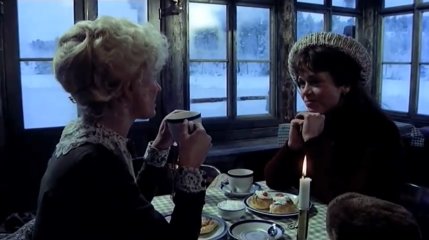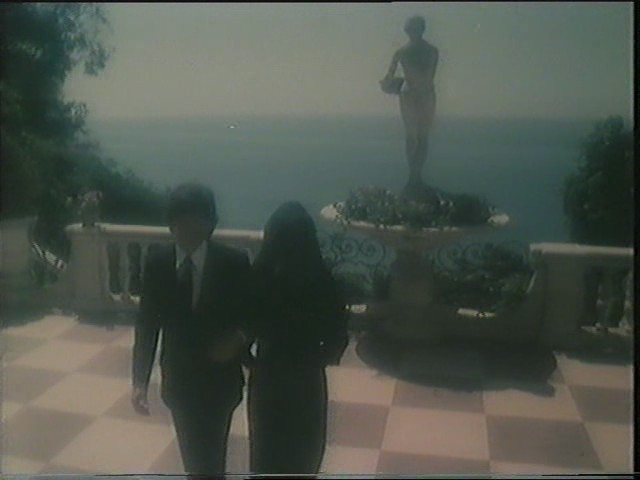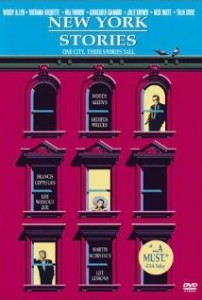From the Chicago Reader (March 3, 1989). — J.R.
NEW YORK STORIES
*** (A must-see)
“Life Lessons”
Directed by Martin Scorsese
Written by Richard Prince
With Nick Nolte, Rosanna Arquette, and Patrick O’Neal.
“Life Without Zoe”
Directed by Francis Coppola
Written by Francis Coppola and Sofia Coppola
With Heather McComb, Talia Shire, Giancarlo Giannini, Don Novello, and Selim Tlili.
“Oedipus Wrecks”
Directed and written by Woody Allen
With Woody Allen, Mae Questel, Mia Farrow, and Julie Kavner.
With the exception of the recent and disappointing Aria, there have been no films made of late that consist of thematically related sketches, compilations of episodes by one director or more. New York Stories may help make the form fashionable again. The arbitrariness of the standard running time of features, at least from an artistic standpoint, makes a good many movies needlessly padded and a few others shorter than they should be, while the difficulty in marketing shorts discourages most commercially established filmmakers from even attempting to work in the form. New York Stories came about because Woody Allen wanted to make a short and decided that incorporating it within an anthology would make it commercially feasible.
The usual argument made against sketch movies is that they’re invariably uneven — which is true enough but also rather beside the point. Read more
From the January 15, 1999 Chicago Reader. — J.R.
The Thin Red Line
Rating *** A must see
Directed and written by Terrence Malick
With Sean Penn, Adrien Brody, Jim Caviezel, Ben Chaplin, John Cusack, Woody Harrelson, Elias Koteas, Nick Nolte, John C. Reilly, Arie Verveen, Dash Mihok, John Savage, John Travolta, and George Clooney.

Last week the National Society of Film Critics voted Out of Sight the year’s best picture, also awarding it best screenplay and best direction. If this baffles or bemuses you, you should know that the awards in each category are chosen by multiple ballots listing three titles in order of preference. What now seems like a collective preference for a sexy thriller over more ambitious pictures was in effect a tie-breaker between two irreconcilable positions.
As a participant in the meeting I saw partisans of Steven Spielberg’s Saving Private Ryan square off against partisans of The Thin Red Line, Terrence Malick’s first film since Days of Heaven (1978). Practically no one voted for both — only Michael Wilmington of the Chicago Tribune comes to mind — so Steven Soderbergh lurched forward as a second choice, finally copping 28 votes while Spielberg and Malick tied for second place with 25 votes apiece. Read more
My 1973 Cannes coverage for London’s Time Out (which ran in their June 8-14 issue, about a year before I moved to London from Paris), slightly tweaked. I’m pretty sure I submitted something longer and more detailed (judging from my penultimate sentence, my account of Jerry Schatzberg’s Scarecrow must have been one of the several things that was cut), but I no longer have the original version to verify this. — J.R.
May 11: Discounting Godspell, the opening film, which I avoided seeing yesterday both for its sake and for mine, the festival got off to a rousing start today with two strong and absorbing films.
Joseph Losey’s A Doll’s House -– shown in the official festival, out of competition — cannot however be considered a successful embodiment of the Ibsen play. The authorial agendas of Ibsen, Losey, and [Jane] Fonda ultimately diverge more than combine, and we arrive at an abrupt impasse – a torso of the play that’s still missing a head.


‘To waken the sleeping beauty,’ says a carnival barker in James B. Read more




